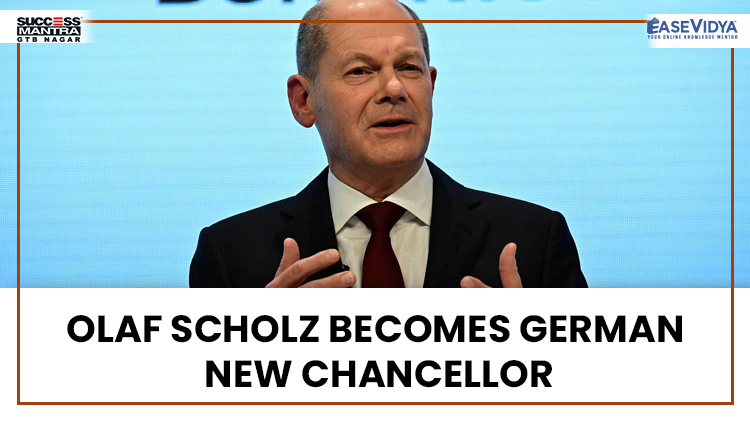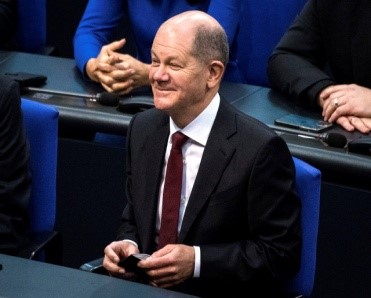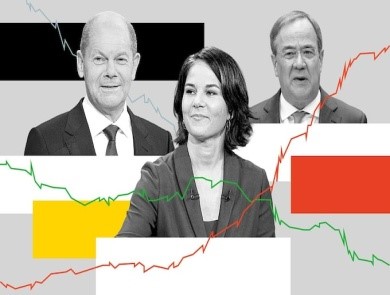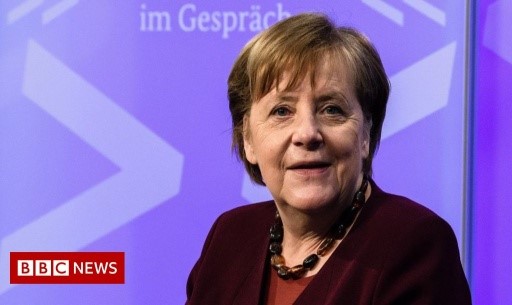
OLAF SCHOLZ BECOMES GERMAN NEW CHANCELLOR
OLAF SCHOLZ BECOMES GERMAN NEW CHANCELLOR
Social Democrat Olaf Scholz will take oath as the new Chancellor of Germany on December 8, 2021, marking an end to the 16-year rule of Angela Merkel, who had been the first female chancellor of Germany. India has deep relations with Germany and it is expected to continue as per the newly elected tripartite coalition led by Olaf Scholz. German Ambassador to India Walter J Lindner informed that Olaf Scholz has notably visited once before in 2012 when he was the Mayor Hamburg. He had visited New Delhi and Mumbai during his trip. Olaf Scholz was confirmed to be the next German chancellor after the leaders of three parties sealed a coalition deal. The pact paves way for a three-way coalition government comprising the Social Democrats (SPD), Greens and liberal Free Democrats (FDP).

German Coalition Pact: The SPD, Greens and FDP coalition pact brings to an end nearly five weeks of formal negotiations. The 3-way coalition is known as the traffic-light coalition, due to their respective colors of red, green and yellow. The parties worked behind closed doors to reach an agreement. The coalition government will mark an end to 16 years of conservative-led rule. Angela Merkel's conservative party narrowly lost to the Social Democrats in the 2021 German National Elections. The Social Democrats claimed a clear mandate to lead the government for the first time since 2005, but they have not won the majority. The center-left party won 26 percent of the vote, ahead of the 24.5 percent vote won by Merkel's CDU/CSU conservative bloc, as per the projected results revealed on September 26, 2021. Neither bloc won the majority and nor did they show any keenness to form a grand coalition like they did in the past four years. Angela Merkel remained in a caretaker role till the new government took office. The change of government in Germany comes at a crucial time when relations between France and the US, Australia are strained over the new AUKUS pact. Germany is yet to respond to the situation.
Current Affairs Notes By Success Mantra Coaching Institute GTB Nagar Delhi CLICK HERE
OLAF SCHOLZ AS NEW GERMAN CHANCELLOR
Olaf Scholz was till recently serving as Germany's Finance Minister and Merkel's deputy in the grand coalition. Following the German Election Results 2021, he had said that his party would do everything it can to ensure that they form a government by Christmas. The 63-year-old Scholz will become the fourth post-war SPD chancellor after Willy Brandt, Helmut Schmidt and Gerhard Schroeder. Social Democratic Party's Helmut Waldemar Schmidt had served as the Chancellor of West Germany from 1974 to 1982 in coalition with the Free Democrats even though his party had won fewer parliamentary seats than the conservative bloc.
The incumbent German Chancellor Angela Merkel did not run in the 2021 German national elections, marking the first time in the history of the Federal Republic that an incumbent did not run. She has decided to retire after serving as German Chancellor for 16 years. Her stepping down has left a huge vacuum in the heart of German politics. Angela Merkel had taken office in 2005, becoming the first female chancellor of Germany. Ever since she took office, she has been described as the de facto leader of the European Union, the most powerful woman and one of the world's most successful political leaders. She has stood largely on the European stage since the time when George W. Bush was US president, Tony Blair was UK Prime Minister and Jacques Chirac was the French President. She has dealt with four US Presidents, five UK Prime Ministers, four French Presidents and seven Italian Prime Ministers during her 16-year rule.
HOW DOES THE GERMAN ELECTION WORK?
The 2021 German Elections on September 26, 2021, will elect the members of the 20th Bundestag, the lower house of parliament for a 4-year-term. Then the Chancellor will be elected. Germany applies the mixed-member proportional representation system which uses a system of proportional representation combined with elements of first-past-the-post voting. These seats are distributed between the 16 German states in proportion to the number of eligible voters in the State. Each voter gets two votes per ballot: the first vote is a constituency vote and the second vote is a party-list vote. The first vote decides in the election of 299 members in single-member constituencies by first-past-the-post voting. The second votes help in allocating a proportional number of seats for parties, first in the states and then in the Bundestag. These seats are allocated using the Sainte-Lague method. If a party wins fewer constituency votes (first votes share) in a state than it is entitled as per its party list vote (second votes share), then it receives additional seats from the relevant state list. If a party wins more constituency votes (first votes share) in a state than it is entitled as per its party list vote (second votes share), it creates a number of overhang seats. In this case, other parties receive compensation seats. That is why, the Bundestag usually has more than 598 members such as the 19th (current) Bundestag had 709 seats, 598 regular seats and 111 overhand (compensation) seats.
PRAVAHINI Current Affairs Notes By Success Mantra Coaching Institute GTB Nagar Delhi CLICK HERE
HOW MEMBERS’ ARE ELECTED TO BUNDESTAG?
In order for a party to be elected to the Bundestag, it has to win at least 5% of the second votes nationwide or win three single-member constituencies via first votes. This threshold keeps the small parties from entering the Parliament. Currently, the Bundestag represents 6 parties: Chancellor Angela Merkel's center-right CDU and its Bavarian sister party the Christian Social Union (CSU), the center-left Social Democrats (SPD), the Left Party, the Greens, and the far-right Alternative for Germany (AfD).

If Germans don't vote for the chancellor, who does?
The newly-elected Bundestag votes for Germany's chancellor. A chancellor needs to receive an absolute majority, more than half, of the votes in parliament to be elected..That is where coalitions come into play. Because there are several political parties represented in the Bundestag, it's unusual for a chancellor to receive an absolute majority of votes from only his or her party. To secure more than half of the votes, a larger party may team up with smaller parties to form a coalition government. In the 2013 elections, Angela Merkel's Christian Democratic Union (CDU) and its sister party Christian Social Union (CSU) teamed up with the Social Democratic Party (SPD) to form a grand coalition. Once a coalition is formed, members of the Bundestag vote to elect the chancellor.
WHY IS THE SYSTEM SO COMPLICATED?
Many Germans saw the failure of the pre-World War II Weimar Republic as the failure of the country's fragmented parliamentary system. After World War II, the Federal Republic of Germany transferred power from the President toward the Bundestag and encouraged political majorities to pass legislation. Germany's current system emphasizes a strong party discipline between the executive and legislative branches, according to Josef Braml of the German Council on Foreign Relations.
WHO ELECTS CHANCELLOR IN GERMANY?
In Germany, the Chancellor is the Head of the Government. The Chancellor is not directly elected, unlike the US Presidential elections. The process to elect the Chancellor in Germany can take up to weeks or months. As per the polls, the negotiations will be complicated this time. No single party is expected to reach a parliamentary majority this time. Therefore, the election results will help to determine what coalition governments could be possible. A detailed coalition agreement will be expected to be produced which will need approval in votes by party congresses or even a ballot. Once the Coalition government is ready, the President of Germany will nominate a candidate for Chancellor to the Bundestag. The candidate does not have to be a member of parliament. The candidate will require a majority of all members to be elected as Chancellor. Until the new government takes charge, the outgoing Chancellor (in this case Chancellor Angela Merkel) will stay on in caretaker capacity. Three parties have fielded candidates to be Chancellor: Armin Laschet for the Centre-right Christian Democrats, Olaf Scholz for the Centre-left Social Democrats, and Annalena Baerbock for the Greens.

STRUCTURE OF GERMAN PARLIAMENT
The German parliament has two chambers viz. Federal Diet (Bundestag) & Federal Council ((Bundesrat)
Federal Diet (Bundestag): The Federal Diet (Bundestag) nominally has 598 members who are elected for a 4 year term. 299 members elected in single-seat constituencies according to first-past-the-post, while a further 299 members are allocated from statewide party lists to achieve a proportional distribution in the legislature, conducted according to a system of proportional representation called the Mixed member proportional representation system. In the current parliament there are 16 overhang seats, giving a total of 614.
Federal Council: The Federal Council (Bundesrat) has 69 members representing the governments of the states
ELECTION SYSTEM IN INDIA
India has a parliamentary system as defined by its constitution, with power distributed between the central government and the states. The President of India is the ceremonial head of the country and supreme commander-in-chief for all defence forces in India. He works on the aid and advice of the council of ministers headed by the Prime Minister. However, it is the Prime Minister of India, who is the leader of the party or political alliance having a majority in the national elections to the Lok Sabha, that exercises most executive powers for matters that require countrywide effection under a federal system. India is regionally divided into States (and Union Territories) and each State has a Chief Minister who is the leader of the party or political alliance that has won a majority in the regional elections otherwise known as State Assembly Elections that exercises executive powers in that State. The respective State's Chief Minister has executive powers within the State and works jointly with the Prime Minister of India or their ministers on matters that require both State and Central attention. Some Union Territories also elect an Assembly and have a territorial government and other (mainly smaller) Union Territories are governed by a person appointed by the President of India.
The President of India monitors the rule of law through their appointed governors in each State and on their recommendation can take over the executive powers from the Chief Minister of the State, temporarily when the elected representatives of the State government has failed to create a peaceful environment and has deteriorated into chaos. The President of India dissolves the existing State government if necessary, and a new election is conducted.
Elections in the Republic of India include elections for:
- Members of the Parliament in Lok Sabha and Rajya Sabha,
- Members of State Legislative Assemblies, (and also Assembly elections to some of the Union Territories like Delhi and Puducherry),
- Members of State Legislative Councils,
- Members in village panchayats or city corporation councils.
- By-election is held when a person of a particular constituent dies, resigns, or is disqualified.
TEST YOURSELF
Q.1 Olaf Schloz who recently became the new German Chancellor hails from which of the following political parties of Germany?
- Green Party
- Social Democratic Party: ANSWER
- Liberal Party of Germany
- None of the following
Q.2 Consider the given statements & state which of the following is/are incorrect in the reference to the above mentioned passage?
- In German Elections, each voter gets two votes per ballot: the first vote is a constituency vote and the second vote is a party-list vote.
- In Germany, the Prime Minister is the Head of the Government & the PM is not directly elected, unlike the US Presidential elections.
- Only I follows
- Only II follows: ANSWER
- Both I & II follows
- None of the above
Q.3 The 2021 German Elections on September 26, 2021, had elected the members of the 20th ___________ for a 4-year-term in the nation.
- Bundestag, the lower house of German parliament: ANSWER
- Bundesrat, the upper House of the German Parliament.
- Bundestag, the upper house of German parliament
- Bundesrat, the lower house of German parliament
Q.4 Which of the following German politicians could become the next German head of state after the elections?
- Conservative Party's candidate, Angela Merkel
- Social Democrats' candidate, Olaf Scholz
- Annalena Baerbock for the Greens
- None of the following
Q.5 Consider the given options & state which of the following is matched correctly?
- Bundesrat ----- Lower House of German Parliament
- House of Senate ----- Lower House of US Parliament
- Diet ----- National Parliament of Japan
- All of the above













0 Comment